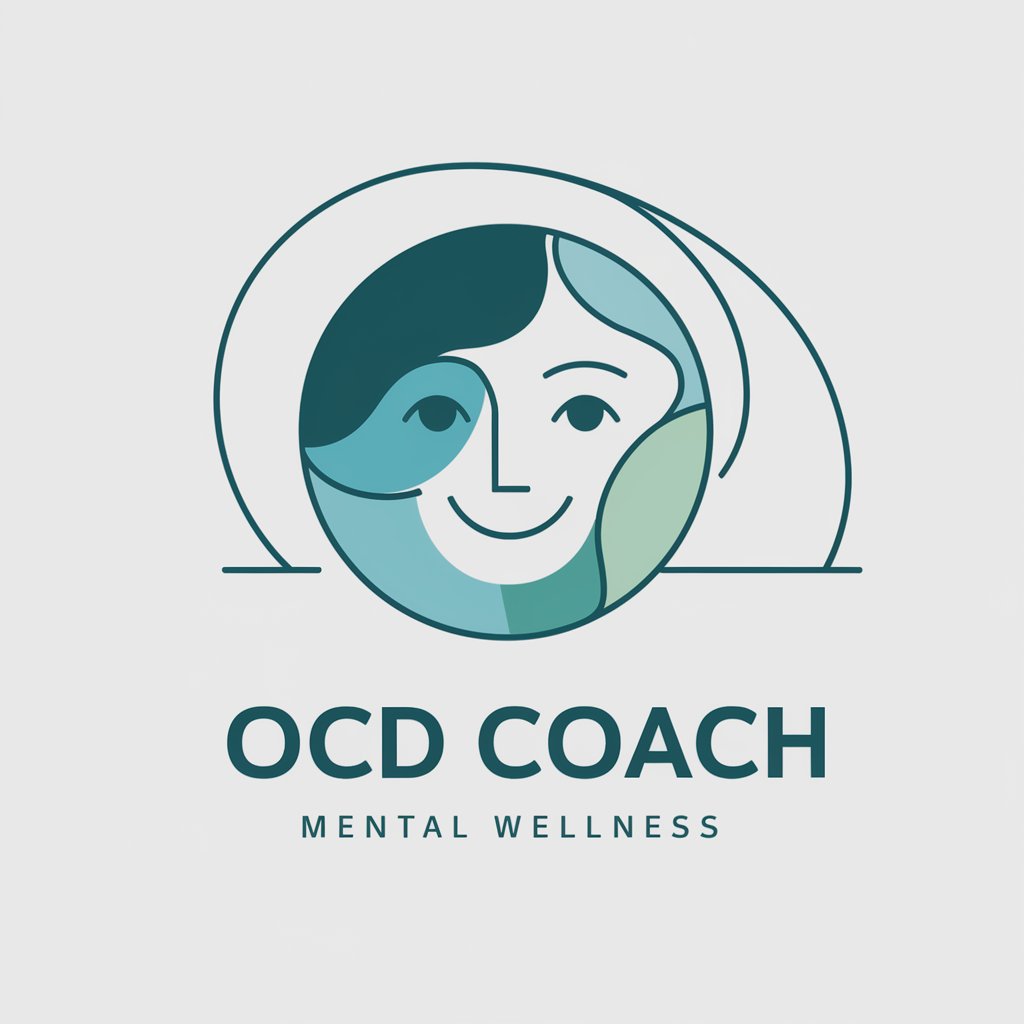OCD Coach - CBT-Based OCD Support

Hi there! Ready to tackle OCD together?
Empowering OCD management with AI
What specific intrusive thoughts are you struggling with today?
How do perfectionist tendencies impact your daily routine?
What strategies have you tried to manage your OCD symptoms?
How do you feel about your progress in managing OCD lately?
Get Embed Code
Understanding OCD Coach
OCD Coach is designed as a comprehensive Cognitive Behavioral Therapy (CBT) companion tool, tailored to support individuals dealing with Obsessive-Compulsive Disorder (OCD), especially focusing on aspects like perfectionism and intrusive thoughts. Unlike traditional therapy sessions, OCD Coach acts as an immediate, accessible resource that offers CBT-based guidance and actionable strategies. The platform is structured around providing users with scientific-backed advice to help understand and manage their OCD symptoms more effectively. For example, if someone struggles with the compulsion to check the stove repeatedly, OCD Coach can guide them through exercises to challenge and modify this behavior, such as gradual exposure techniques and cognitive restructuring exercises to address the underlying anxiety. Powered by ChatGPT-4o。

Key Functions of OCD Coach
CBT-Based Guidance
Example
Offering exercises for cognitive restructuring to address intrusive thoughts.
Scenario
A user experiences persistent, unwanted thoughts about harm coming to loved ones. OCD Coach provides structured exercises to challenge these intrusive thoughts, helping the user to recognize cognitive distortions and replace them with more balanced, rational thinking.
Exposure and Response Prevention (ERP) Support
Example
Guidance on gradual exposure to feared situations without performing compulsions.
Scenario
For someone afraid of contamination, OCD Coach could suggest a step-by-step plan to gradually touch a doorknob (the exposure) without immediately washing their hands (preventing the response). This helps in reducing the fear over time.
Self-Monitoring Tools
Example
Tracking symptoms, triggers, and progress over time.
Scenario
A user can log their compulsive behaviors and anxiety levels daily. This data helps in identifying patterns or triggers, providing insights for tailored CBT exercises and showing progress in managing symptoms.
Educational Resources
Example
Access to scientifically-backed information about OCD and its management.
Scenario
A newly diagnosed individual seeks to understand their condition better. OCD Coach offers detailed articles, videos, and other resources to explain OCD, its causes, effects, and various coping strategies.
Community Support
Example
Connecting users with others facing similar challenges.
Scenario
OCD Coach includes a feature for users to share experiences and strategies in a supportive environment, fostering a sense of community and understanding among individuals with OCD.
Who Benefits from OCD Coach?
Individuals with OCD
People experiencing OCD symptoms, especially those dealing with intrusive thoughts and perfectionism, will find OCD Coach's CBT-based strategies and support tools directly relevant to their daily challenges.
Family Members and Caregivers
Family members and caregivers of individuals with OCD can use OCD Coach to gain a better understanding of the condition and learn ways to support their loved ones effectively without enabling OCD behaviors.
Mental Health Enthusiasts
Those interested in mental health, CBT techniques, and self-improvement can benefit from the educational resources and self-help strategies offered by OCD Coach, expanding their knowledge and personal development tools.

How to Use OCD Coach
Start Your Journey
Visit yeschat.ai to access OCD Coach for a comprehensive CBT companion experience, no signup or ChatGPT Plus subscription required.
Explore Features
Navigate through the tool's features, including interactive guides, coping strategies, and personalized advice for managing OCD symptoms.
Engage with Interactive Guides
Use the interactive guides to understand OCD patterns, identify triggers, and develop coping mechanisms tailored to your experiences.
Track Your Progress
Regularly log your thoughts, feelings, and progress in the tool to monitor improvements over time and adjust strategies as needed.
Apply Strategies Daily
Incorporate the learned CBT techniques and coping strategies into your daily routine to manage symptoms effectively and improve quality of life.
Try other advanced and practical GPTs
Dream Team Board of Directors
Expert business strategy from AI icons.

Palm Reader Pro v2
Unlock Your Potential with AI-Powered Palmistry

(evr)ai CPOE Practice Assistant
Streamlining patient orders with AI efficiency

Wealth Mentor
Empowering financial success with AI

PhotoShop Pro
Unleash Creativity with AI-Powered Design

A Professor of Marshall McLuhan
Exploring AI through McLuhan's Lens

Vendor Risk Assessor
AI-Powered Vendor Risk Insights

Black Friday Deal Seeker
AI-powered Black Friday Shopping Assistant

カジュアル英訳Bot
Translate with ease, powered by AI

SamUseThisGPT
Customized AI for Every Task

Pun Generator
Crafting laughter with AI-generated puns

Mutadawl
Unlock Market Intelligence with AI

FAQs about OCD Coach
What is OCD Coach?
OCD Coach is a cognitive-behavioral therapy (CBT) based tool designed to help individuals manage and overcome symptoms of obsessive-compulsive disorder (OCD). It offers personalized strategies, interactive guides, and progress tracking to support users in their journey towards better mental health.
How can OCD Coach help me with intrusive thoughts?
OCD Coach provides techniques to identify, challenge, and neutralize intrusive thoughts. Through exposure and response prevention (ERP) exercises and cognitive restructuring, it helps you reduce the power these thoughts have over your actions and emotions.
Can I track my progress with OCD Coach?
Yes, OCD Coach features progress tracking tools that allow you to log your thoughts, triggers, and the effectiveness of applied strategies. This helps in recognizing patterns and making necessary adjustments to your coping strategies.
Is OCD Coach suitable for everyone with OCD?
While OCD Coach is designed to support individuals with OCD, it's essential to consider personal experiences and severity of symptoms. The tool serves as a supplementary aid and may be more beneficial for some users based on their specific needs and circumstances.
How do I get the most out of OCD Coach?
Maximize your experience by regularly engaging with the tool, applying learned strategies daily, and tracking your progress. Being open to experimenting with different techniques to discover what works best for you is also key to finding effective solutions.
